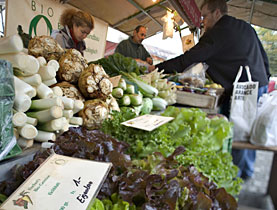
Lack of time and self-control “bad for diet”

Swiss consumers are becoming more careful about what they eat but less satisfied with the quality of food on offer, according to a survey on eating habits.
The main reasons for poor nutrition were lack of self-discipline and time, St Gallen University researchers revealed on Wednesday.
More than 70 per cent of respondents said nutrition was important or very important to them and 55 per cent said they were currently on a diet.
While consumers consider more carefully what they eat, their level of satisfaction has fallen from 73 to 69 per cent since the previous survey by the Institute of Marketing and Retailing in 2005.
The study shows that Swiss consumers are aware of good nutrition and feel they are well-enough informed about the food they should be eating.
“But when it comes to eating habits, there’s a gap between how people want to eat and how they actually eat. People tell us they are intrinsically motivated to eat well but they cannot help not achieving that goal,” Alexandra Glas, co-author of the study told swissinfo.
Swiss residents are above all interested in eating healthy and enjoyable food. Some 65 per cent of those surveyed said these were their top considerations.
Price was rated the least important factor in the choice of food, while the ability to consume quickly has increased in importance. Eating on the move has increased this demand for fast or ready-to-eat food.
The authors of the study said the food production industry needed to look closely at the whole area of convenience food. The image of convenience food improved somewhat in the previous survey, but this time round 26 per cent of respondents said they were unhappy with frozen meals and other packaged food.
Favourites
More than 32 per cent criticised the quality of take-away food. This put take-away meals in 24th – or last place – of all the types of food on offer.
At the top of the list of favourite foods are regional and naturally produced products. The dairy-loving Swiss opted for milk products as first choice, followed by vegetables and bakery items.
Better nutrition in society can only be achieved by supporting people in their daily eating routine, the study pointed out. The introduction of shorter lunch breaks, for example, makes it harder for people to practise good eating habits.
“The involved parties, including the food industry, restaurants, employers, schools and parents should all work together to help people improve their eating habits,” Glas said.
With more than half of the public on diets, the study authors warned that following an eating programme is not enough in itself to reduce weight. It must be combined with integrated lifestyle changes.
Earlier this week the federal authorities launched a campaign to combat obesity among young children in Switzerland.
The programme targets children aged five to ten and aims to introduce an additional hour of physical education per week.
swissinfo with agencies
The fifth national report on nutrition published in 2005 found that 37% of the Swiss population were overweight.
Nearly one in five youngsters, aged 15 to 25, eats fast food at least twice a week.
Diseases and health problems related to weight cost SF2.7 billion every year in Switzerland.
The number of obese children has increased five-fold since 1980, with one in five children overweight.

In compliance with the JTI standards
More: SWI swissinfo.ch certified by the Journalism Trust Initiative
















![The four-metre-long painting "Sonntag der Bergbauern" [Sunday of the Mountain Farmers, 1923-24/26] had to be removed by a crane from the German Chancellery in Berlin for the exhibition in Bern.](https://www.swissinfo.ch/content/wp-content/uploads/sites/13/2025/12/01_Pressebild_KirchnerxKirchner.jpg?ver=a45b19f3)











You can find an overview of ongoing debates with our journalists here . Please join us!
If you want to start a conversation about a topic raised in this article or want to report factual errors, email us at english@swissinfo.ch.